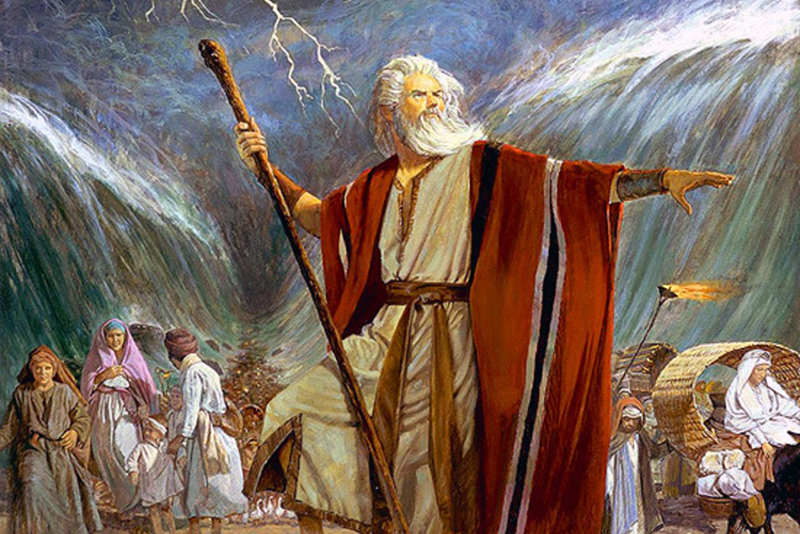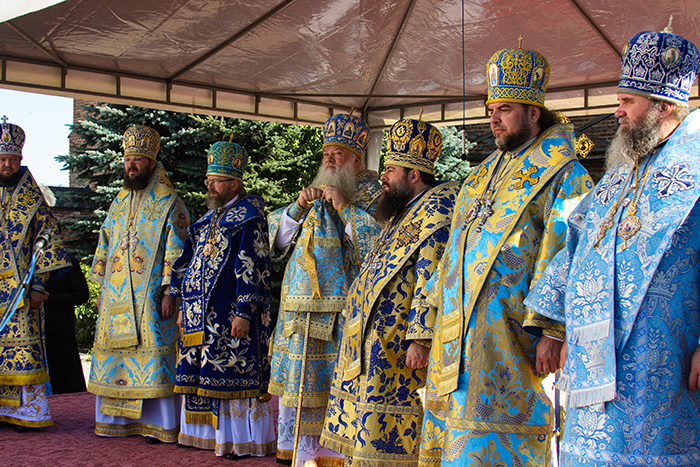
In the Gospels there are many “hard sayings” of our Savior. Of these hard sayings, there are also many which have been all but forgotten — even by those who sincerely strive to be faithful Christians. Of these hard and forgotten sayings, I would like to call our attention today to one in particular:
When you give a dinner or a banquet, do not invite your friends or your brothers or your kinsmen or rich neighbors, lest they also invite you in return, and you be repaid. But when you give a feast, invite the poor, the maimed, the lame, the blind, and you will be blessed, because they cannot repay you. You will be repaid at the resurrection of the just.
If we are honest with ourselves, I think most of us will find that the idea of taking Christ at His word here makes us deeply uncomfortable. Now, I am not trying to suggest that Christ is forbidding us from ever inviting our friends and family over to dinner. But I do think that He was quite serious was He commanded us to invite “the poor, the maimed, the lame, the blind.”
How many of us actually do so? More than that, how many of us are able to even consider doing so without experiencing a profound feeling of dismay?
Perhaps I am wrong. Perhaps many Christians really do make a habit of inviting homeless and disabled strangers into their homes for dinner. They sure used to:
Nor were the poor stigmatized [during the Middles Ages]. If anything they were thought to be morally superior to the rich, particularly if they had voluntarily renounced secular wealth and power. Monks, nobles, and wealthy persons would wash the feet of the poor and invite them to dine. St. Louis, King of France in the 13th century, cut bread and poured drink himself for the paupers whom he fed at his own table.
If one reads the lives of the saints, it is clear King Louis was far from an isolated exception. And although hospitality towards the poor is a quintessentially Christian phenomenon, it is also one with echoes in many ancient cultures and religious traditions throughout the world. Yet in the modern West, hospitality is all but dead:
In a recent issue of The Alabama Baptist, state leader Dr. Rick Lance tells of a foreign exchange student who was completing his education in the United States and about to head home. To his roommate, he said, “You can have this suitcase and everything in it.”
The friend said, “What’s in it?”
The exchange student said, “When I left home for America, my family filled it with gifts to be presented to families inviting me into their homes. But no one ever invited me, so everything is still in the suitcase.”
Rick says this is just about the saddest story he has heard in a long time.
But this is by no means to say that the poor are entirely forgotten. On the contrary, modernity has facilitated the creation of vast social organizations and welfare programs dedicated solely to feeding, clothing, and housing the poor. The War on Poverty might have fallen out of fashion as a catchphrase, but not for lack of funding: the US government spent $754 billion last year on domestic welfare programs alone (this does not include foreign aid).
Almsgiving has become systemized. Charity has become organized.
But the word “alms” comes from the Greek word “ἔλεος” — mercy, the same word used in the eternal refrain of the faithful in Orthodox worship: “Lord, have mercy.” To give alms means to participate in the mercy and the divine love of God.
It most emphatically does not mean to merely give someone a handout.
Likewise, the word “charity” once meant “love.” And not just any love — no, it once meant divine love, the love of God, a love so great and so eternal that St. Paul once thundered forth some of the most famous words in all Christendom: “and now abideth faith, hope, charity, these three; but the greatest of these is charity.”
Nowadays, the word “charity” means a check that we write once a month and stuff absentmindedly into an envelope, never to be thought of again.
And so it has come to pass that we Americans can spend hundreds of billions of dollars each year on “charity,” and yet for the most part it would never even occur to us to invite so much as one destitute stranger into our homes. More than this, I truly believe that most of us would far prefer to part with hundreds or even thousands of our hard-earned dollars rather than to spend even one such evening “entertaining strangers.”
Though this bizarre and depressing phenomenon has perhaps reached its apogee in modern times, it has its roots at least several centuries into the past. In the 19th-century novel Bleak House, Charles Dickens describes the “telescopic philanthropy” of Mrs. Jellyby, whose constant obsession with missionary work halfway around the world blinds her to the misery she causes her to her own family. Likewise, in The Brothers Karamazov by Fyodor Dostoevsky there occurs a character who states:
I love mankind, but I am amazed at myself: the more I love mankind in general, the less I love people in particular, that is, individually, as separate persons. In my dreams, I often went so far as to think passionately of serving mankind, and, it may be, would really have gone to the cross for people if it were somehow suddenly necessary, and yet I am incapable of living in the same room with anyone even for two days, this I know from experience. As soon as someone is there, close to me, his personality oppresses my self-esteem and restricts my freedom. In twenty-four hours I can begin to hate even the best of men: one because he takes too long eating his dinner, another because he has a cold and keeps blowing his nose. I become the enemy of people the moment they touch me. On the other hand, it has always happened that the more I hate people individually, the more ardent becomes my love for humanity as a whole.
Both novels present these characters with some degree of humor, but the tragedy here is deadly serious — and one which, if we are honest, is not so far from our own hearts.
What is this tragedy, in its essence? We can gain some insight from the meditations which Micah Mattix recently shared based on Aristotle’s Nicomachean Ethics:
Friendship according to Aristotle is the “most necessary” virtue. I won’t go into Aristotle’s types of friendship (those founded on utility, pleasure, and virtue), but I appreciated his view that friendship is one of the foundations of civilization. It is what binds a city together. We see this idea in classical and modern literature, too. Friendship and hospitality (which is welcoming a stranger as a friend) are quintessentially human attributes in The Odyssey, for example, which are not shared by the gods or the sub-human cyclops. These two ideas—that friendship is the basis of civilization and a touchstone of humanity—are also found in Francis Bacon’s short essay “Of Friendship,” which is obviously drawn from classical sources. Whatever “delights in solitude,” Bacon writes, “is either a wild beast or a god. For it is most true, that a natural and secret hatred, and aversation towards society, in any man, hath somewhat of the savage beast.” It’s not that solitude is bad or unnecessary. It is that to live only in solitude is to live a sub-human life. Without friends, Bacon continues, the “world is but a wilderness.”
I want to continue with Mattix’ train of thought, but before doing so I must point out that it is precisely for this reason that the eremitic life of solitude is so incredibly dangerous for monastics who have not first spent many long years learning humility, obedience, and love in a cenobitic monastery. If a monk departs into the desert thinking that he is finally freeing himself from the burden of his brothers, then he will swiftly and undoubtedly perish. The Christian life of solitude can only be rightly undertaken by one whose heart, in the words of St. Isaac the Syrian (truly the hermit par excellence) “is burning with love for all creation.”
To return to Mattix:
It seems to me that we’ve lost this high view of friendship as an aspect of human identity, which we now regularly confuse with personality or view as a discrete construction of the autonomous will rather than as something that is composed of universal attributes. So, it is no surprise that our lives increasingly look like those of the cyclops. We live in caves, in fenced-in back yards, and “consume” each other—on television, in movies, on Facebook and Twitter. And because our lives (I’m speaking generally here about American culture) are ordered around maximizing physical pleasure, not virtue, they must end in suicide when the body’s capacity for physical pleasure wanes. The opioid crisis starts with this low view of human nature and won’t end until a grander view is recaptured, which I don’t see happening any time soon.
Mattix’ insight here is tremendous. The suicide of the West which we see all around us is, in a very real sense, the logical outcome of a society which no longer loves the poor, but merely hates poverty — a society in which men and women have chosen to give one another their money, but not themselves. A society which has departed infinitely far from the spirit in which St. Paul (whom we commemorate today on the Old Calendar) once cried out: “I seek not yours, but you.”
And let us Christians not allow ourselves to be distracted and confused by the many who preach the so-called “social gospel”: our Faith has absolutely nothing to do with an attempt to eradicate poverty. The Lord said: “ye have the poor always with you” — and what is more, He repeatedly pronounced the blessedness of the poor, while preaching woe to the rich and the comfortable. No, the War on Poverty is by no means a Christian war.
How are we to reconcile this with the tremendous emphasis on almsgiving in Christian life? After all, the charity of Christians was second perhaps only to martyrdom in attracting converts to the Faith during the early centuries of Christianity.
It is really quite simple: Christian almsgiving has nothing to do with money — it has everything to do with Christ. Almsgiving is about obeying the commandment of Christ to “make to yourselves friends of the mammon of unrighteousness,” and of St. Paul to be as “they that buy, as though they possessed not; and they that use this world, as not abusing it: for the fashion of this world passeth away.”
Almsgiving is about turning the worthless things of this vain and swiftly-passing life into a means of giving to another human being the eternal love of God.
The early Christians caused astonishment to the secular society around them precisely because they showed such indifference towards wealth, freely distributing it to those whom society scorned as worthless. And yet this same contempt for worldliness has somehow been slowly transformed into a desire to make sure that everyone has plenty of stuff.
Consider the following passage from the books of Acts:
Now Peter and John went up together into the temple at the hour of prayer, being the ninth hour. And a certain man lame from his mother’s womb was carried, whom they laid daily at the gate of the temple which is called Beautiful, to ask alms of them that entered into the temple; who seeing Peter and John about to go into the temple asked an alms. And Peter, fastening his eyes upon him with John, said, Look on us. And he gave heed unto them, expecting to receive something of them. Then Peter said, Silver and gold have I none; but such as I have give I thee: In the name of Jesus Christ of Nazareth rise up and walk. And he took him by the right hand, and lifted him up: and immediately his feet and ankle bones received strength. And he leaping up stood, and walked, and entered with them into the temple, walking, and leaping, and praising God.
Here St. Peter fulfilled the true purpose of almsgiving, though he gave neither silver nor gold. Nor was it even physical healing that St. Peter principally gave; no, instead he gave to the lame man — and to all around — the most precious gift of all when he then cried out: “Repent ye therefore, and be converted, that your sins may be blotted out, when the times of refreshing shall come from the presence of the Lord.”
Now I will ask you: what if St. Peter had merely taken out a twenty, dropped it in the man’s hat, and walked away?
Consider also what we have been warned concerning the Last Judgment, when we will stand before Christ and make an account of our lives on this earth:
When the Son of man shall come in his glory, and all the holy angels with him, then shall he sit upon the throne of his glory: and before him shall be gathered all nations: and he shall separate them one from another, as a shepherd divideth his sheep from the goats: and he shall set the sheep on his right hand, but the goats on the left.
Then shall the King say unto them on his right hand, Come, ye blessed of my Father, inherit the kingdom prepared for you from the foundation of the world: for I was an hungred, and ye gave me meat: I was thirsty, and ye gave me drink: I was a stranger, and ye took me in: naked, and ye clothed me: I was sick, and ye visited me: I was in prison, and ye came unto me.
Then shall the righteous answer him, saying, Lord, when saw we thee an hungred, and fed thee? or thirsty, and gave thee drink? When saw we thee a stranger, and took thee in? or naked, and clothed thee? Or when saw we thee sick, or in prison, and came unto thee?
And the King shall answer and say unto them, Verily I say unto you, Inasmuch as ye have done it unto one of the least of these my brethren, ye have done it unto me.
These awesome and wondrous words of our Savior tell us that we have the chance, every single day, to meet Him in the flesh. But we will never meet Him — nor will we be found at the end of time to have fulfilled His commandments — if we think that it is merely our money that He wants. He is not asking for a check or for a handout. In the person of every stranger and every pauper that we meet, He cries out: “My son, give me thy heart.”
What we have lost in all of our foundations and benefits, our welfare programs and charity drives, is precisely this: we have lost Christ, and we have lost one another. And as a result, we are well on our way to losing our hearts, our very humanity.
On this feast of the Holy Chief Apostles Peter and Paul, let us follow their example and their advice. Let us obey the words of their Divine Teacher.
Let us invite a stranger over to dinner.




